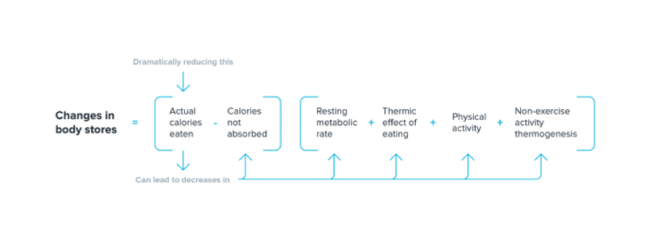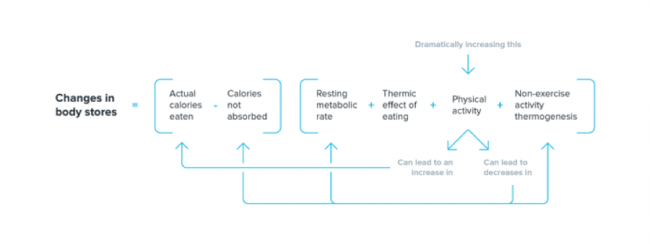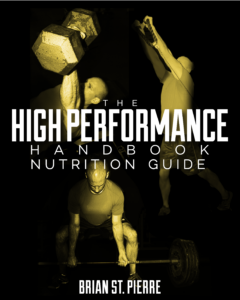
Is a Calorie Really Just a Calorie?
A while back, I posted the following Tweet, and the response got a bit “interesting.”
Love when teams send minor leaguers home with body fat % targets for spring training…after feeding them white bread for previous 7 months.
— Eric Cressey (@EricCressey) November 7, 2016
While most folks shared my sentiment, there were also a small number of followers who decided to hop on a soapbox and remind me that very few foods are, in fact, evil, and that total calories are really what matters in the energy balance equation. Months later, Brian St. Pierre (Director of Performance Nutrition for Precision Nutrition) made the following observation during his seminar at Cressey Sports Performance:
BSP: “Energy balance determines body weight, but not body composition.”
— Eric Cressey (@EricCressey) April 9, 2017
It got me to thinking about how it’d be a good idea to bring Brian in for a guest blog on the topic, so here it is. It’s especially timely, as Brian wrote the nutrition guide for The High Performance Handbook, which is on sale for $30 off this week.
I’ll let Brian take it from here; enjoy! -EC
Energy balance determines body weight, not necessarily body composition.
There has been a lot of debate about the energy balance equation in the fitness industry. Perhaps, after all, calories-in vs. calories-out is not the ultimate determinant of long-term body weight. Lets put some of it to rest right now.
It is a fundamental law that you need a positive or negative energy (i.e. calorie) balance over time to gain or lose bodily tissues (e.g. muscle, fat).

It is possible to manipulate bodyweight through changes in the amount of extracellular fluid (i.e. water) one is carrying. But this does not reflect changes in mass that matters to most people – muscle or fat.
And to be clear, the energy balance equation is actually more complicated and intertwined than it appears. Energy-in and energy-out are not mutually exclusive – a change to one affects the other. Neither side is static.

Your energy in and energy out are both generally regulated by your brain, so when you purposefully and significantly alter one of those, the brain and body often tries to compensate.
Like so:


This is why calorie math can seem so flawed. You expect your daily 500kcal deficit to lead to a weekly 3500kcal deficit, which should theoretically lead to one pound of fat loss per week.
But this isn’t how the body works. Once you start lowering intake, output gets lowered to account for that. And as you start losing weight, output gets lowered more (because you are moving a smaller body, and due to adaptive thermogenesis).
Plus, if linear math worked for weight loss, you would lose one pound per week indefinitely with that 500kcal deficit, which clearly doesn’t work.
Ok, so we’ve established that energy balance ultimately dictates long-term bodyweight.
But, that doesn’t mean that all calories-in, or even all calories-out, are equal.
So, what determines body composition?
Actually, many things. Body composition is ultimately determined by:
• energy balance
• macronutrient intake (especially protein)
• age and sex hormone levels
• exercise style/frequency/intensity/duration (e.g. resistance training vs marathon training vs walking)
• medication use (e.g. birth control)
• genetic predisposition (as well as epigenetics, or even just gene expression)
• sleep quality and quantity
• stress
• and more
Ultimately, this brings me back to the question of: is a calorie a calorie?
On one hand, the answer is yes. A calorie is a unit of measure, so of course a calorie is a calorie.
On the other hand, not all calories consumed have equal absorption or digestion kinetics, cause the same hormonal response, or have the same effects on bodily tissues.
If one ate 3000kcal per day of highly processed foods vs 3000kcal per day of lean protein, fibrous veggies, and minimally processed carbs and fats, the two intakes wouldn’t necessarily have the same long-term outcome on body weight.

Because the composition of the calories-in would have differing impacts on calories-out (e.g. thermic effect of feeding would be higher with the minimally processed foods intake and higher protein), as well there would be fewer calories absorbed from the minimally processed foods. Thus, the minimally processed intake would result in more calories-out, and less calories-in overall.
And it especially wouldn’t have the same long-term outcome on one’s body composition. Particularly due to the very low protein intake from the highly processed diet, which would likely lead to lean mass loss over time. Not too mention the differences in micronutrient intake, likely impacting hormone status, energy levels, etc.
(And of course, these differing intakes certainly would not have the same outcome on long-term health. Nor does this take into account the drastically different effects on satiation and satiety these diets would create. Nor many other factors that influence eating. Which are nicely outlined here.)
Too often, I see fitness pros arguing that food quality doesn’t matter. That the only thing that matters is meeting your calorie and macro goals.
This is likely mostly true for body weight and body composition management, at least for the short term.
However, there are other elements at play here for long-term health, body composition, performance, and quality of life.
Fiber intake, phytonutrients, effects of food on gene expression, effects on satiety and satiation, enjoyment of intake for sustainability. And so much more.
The fact is most people aren’t going to count macros. Some might, and that’s awesome. Use that approach with those folks. However, most won’t.
So, by getting folks to focus on eating mostly minimally processed foods, as well as adequate protein, it can make it easier for them to control their energy balance and get in an appropriate intake of macronutrients.
Minimally processed foods help to accomplish this in many ways:
• generally less calorie-dense
• higher in water content
• higher in fiber content
• generally not hyper-rewarding
• generally not hyper-palatable
• cause faster satiation (satisfaction to end a meal)
• increase satiety levels (levels of satisfaction between meals)
Ultimately, pretty much all foods can fit into a healthy and sustainable intake. The amount to which they fit in will depend on the person and their goals.
As usual, most things fall onto a spectrum. Instead of preaching that people shouldn’t eat any white carbs, or gluten, or sugar, or whatever the demon of the day is, or that all that matters is IIFYM, the best bet for most people is to end up somewhere in the middle.
Both food quality and quantity matter. For most people, who aren’t going to weigh or measure every bit of food they eat, food quality will actually impact food quantity for the reasons outlined above.
This doesn’t mean folks need to eat “clean” – whatever that might mean. It simply means most folks would do best eating mostly minimally processed foods. Processed foods are okay, too, in reasonable amounts. They should just be eaten less often, or in smaller quantities. It’s the context of someone’s entire intake that determines their body weight and body composition, not any one food.
In the end, remember that while energy balance does determine your body weight, there are other important factors in addition to energy balance that determines your body composition.
Note: all the references to this article will be posted as the first comment below.
Looking for more great nutrition lessons, practical recommendations, and sample meal plans? Check out Brian’s Nutrition Guide as part of The High Performance Handbook Gold Package.
About the Author
A Certified Sports Nutritionist as well as a Certified Strength and Conditioning Specialist, Brian St. Pierre also holds a Masters degree in human nutrition and dietetics. As a student, Brian’s passion led him to Cressey Sports Performance, where he worked as the facility’s first intern, and subsequently as a strength coach and the center’s head nutritionist. Now he serves as Precision Nutrition’s Director of Performance Nutrition.



